Sahih Hadith of Muslim.
Whoever Introduces A Good Practise In Islam is Rewarded.
The Prophet ﷺ said, as narrated by Al-Imam Muslim in his Sahih:
مَنْ سَنَّ فِي الْإِسْلَامِ سُنَّةً حَسَنَة كَانَ لَهُ أَجْرُهَا وَأَجْرُ مَنْ عَمِلَ بِهَا بَعْدَهُ مِنْ غَيْرِ أَنْ يَنْقُصَ مِنْ أُجُوْرِهِمْ شَيْء وَمَنْ سَنَّ فِي الْإِسْلَامِ سُنَّةً سَيِّئَة كَانَ عَلَيْهِ وِزْرُهَا وَوِزْرُ مَنْ عَمِلَ بِهَا بَعْدَهُ مِنْ غَيْرِ أَنْ يَنْقُصَ مِنْ أَوْزَارِهِمْ شَيْء.
“Whoever paves a good path (i.e. introduces a good practice) in Islam, then for him is its reward and the reward of whoever practices it after him until Judgment Day. And nothing of their (own) rewards is diminished. And whoever paves an evil path in Islam (i.e. introduces an evil practice), upon him is its sin and the sin of whoever practices it after him until Judgment Day. And nothing of their (own) sins is diminished.”
This is explicit proof for good innovations.
This hadith is neither restricted to the Companions nor to their time, because the Prophet ﷺ gave a general statement that is not restricted and said that the rule applies as long as Islam exists. “Whoever paved in Islam a good path”.
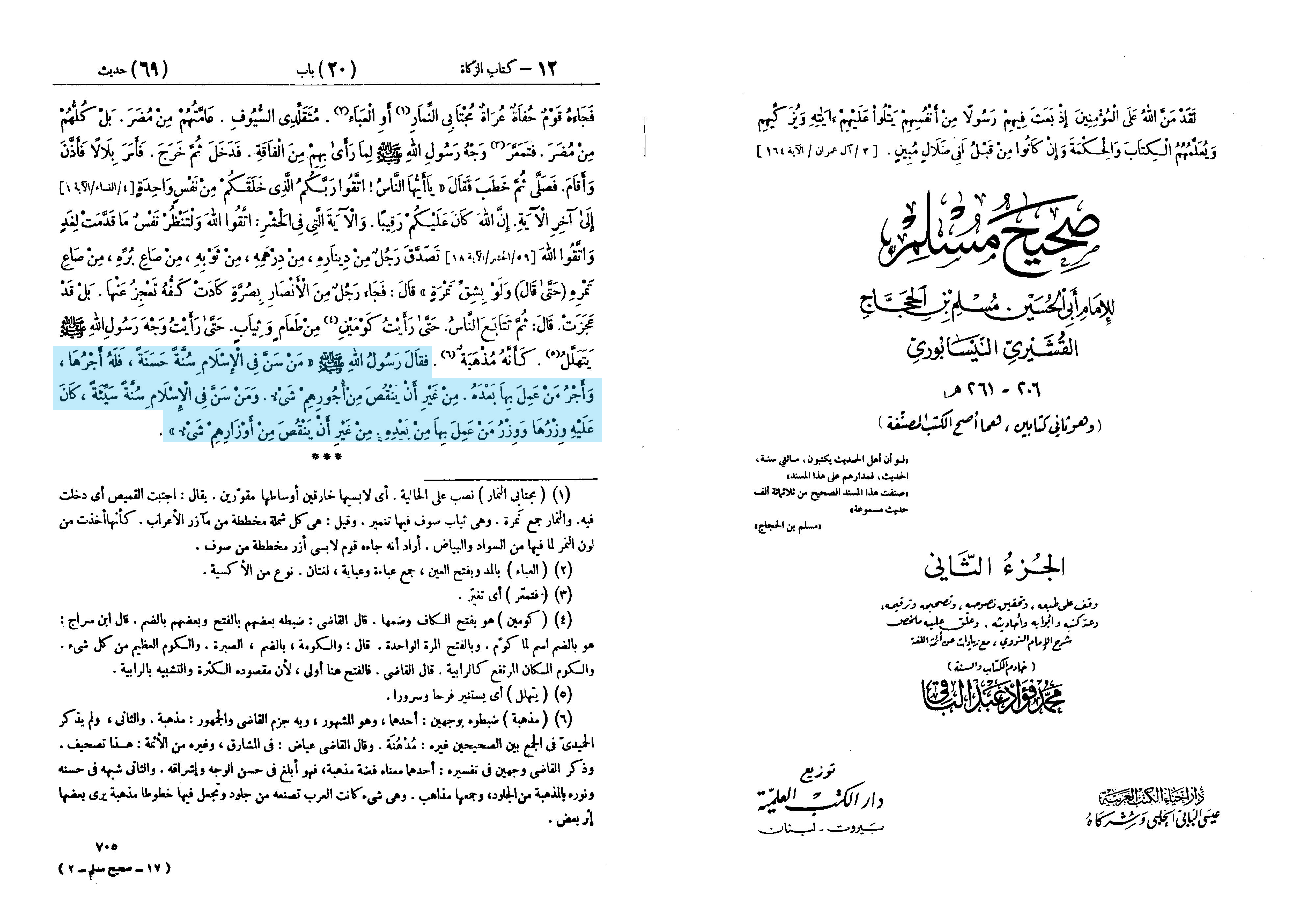
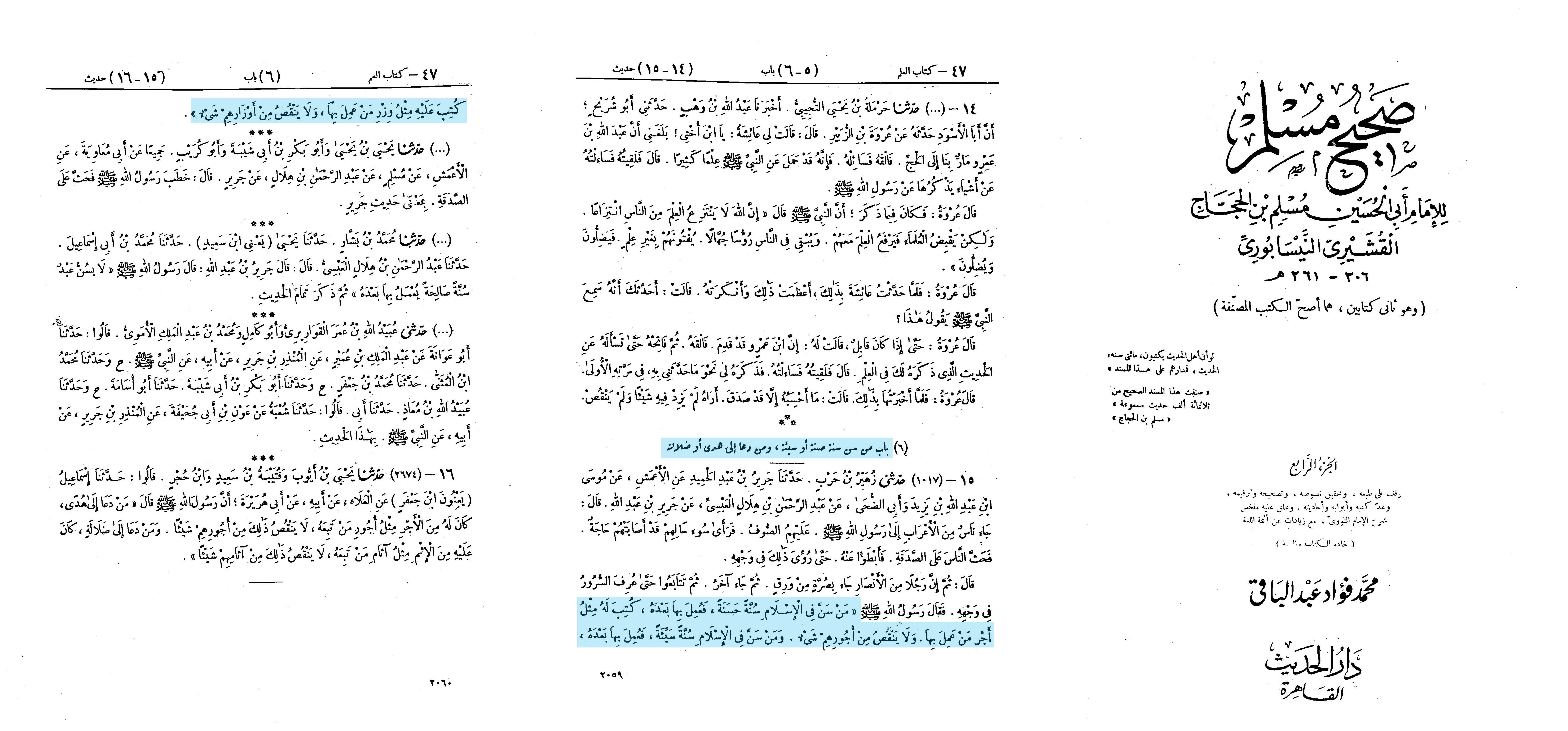
See: Sahih Muslim. Volume 2, Page 705. Hadith Number 1017. https://archive.org/details/waq14478/page/n704/mode/1up
https://sunnah.com/muslim:1017a
See: Sahih Muslim. Volume 4. Page 2059.
https://archive.org/details/waq14478/page/n2058/mode/1up
https://sunnah.com/muslim:1017e
Al-Hafidh An-Nawawiyy on the Hadith of Good Innovation.
Al-Imam An-Nawawiyy, radiyAllahu ^anh, said:
وَفِي هَذَا الْحَدِيثِ تَخْصِيصُ قَوْلِهِ صَلَّى اللَّهُ عَلَيْهِ وَسَلَّمَ كُلَّ مُحْدَثَةٍ بِدْعَةٌ وَكُلَّ بِدْعَةٍ ضَلَالَةٌ وَأَنَّ الْمُرَادَ بِهِ الْمُحْدَثَاتُ الْبَاطِلَةُ وَالْبِدَعُ الْمَذْمُومَةُ
“In this hadith is specification of his saying ﷺ: ‘Every new thing is an innovation, and every innovation is misguidance.’ The intent by it is the invalid new things and the blameworthy innovations.”
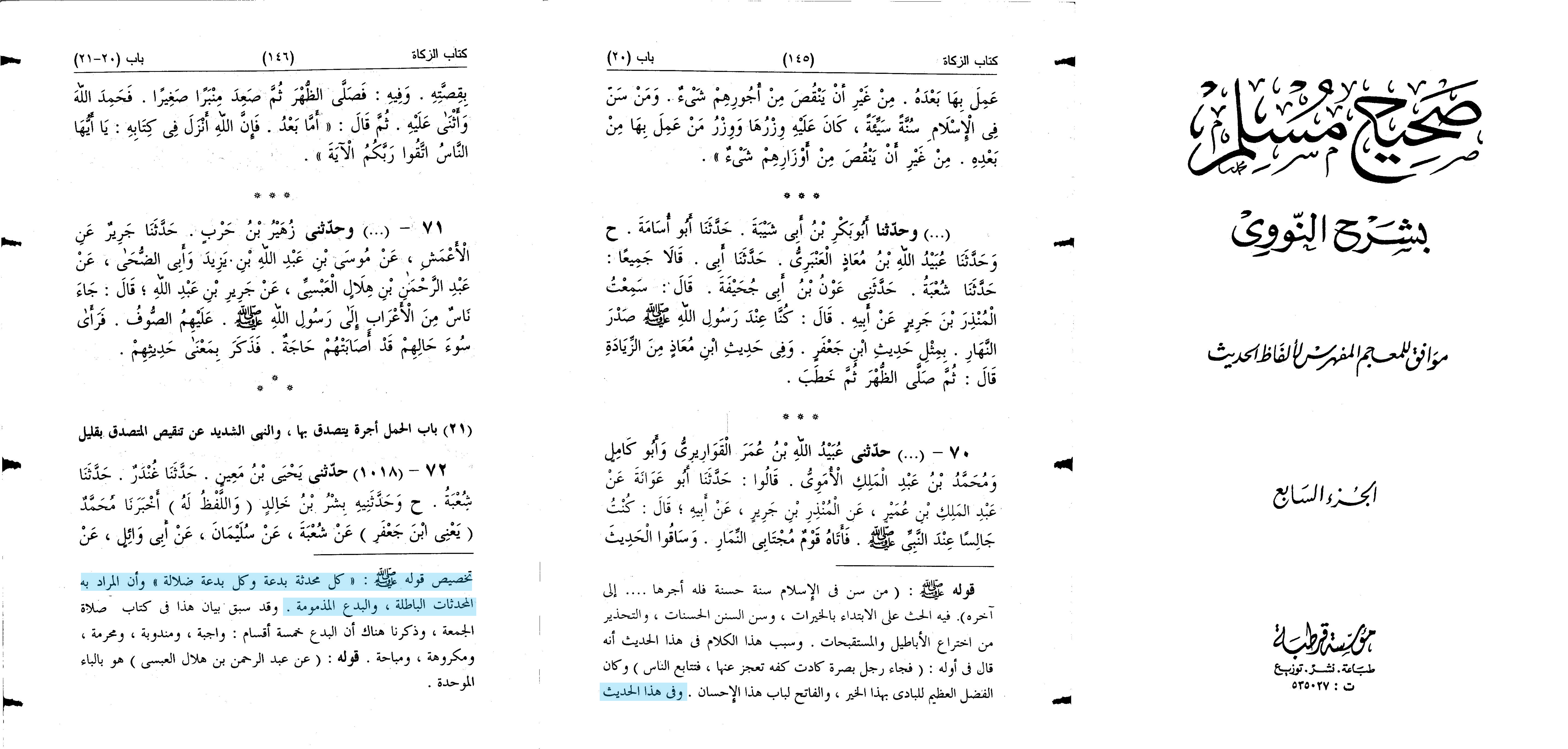
See: Sharh Sahih Muslim (Explanation of Sahih Muslim) by Al-Imam An-Nawawiyy. Volume 7. Page 145-146.
https://archive.org/details/waq13422/07_13425/page/n144/mode/1up
Sahih Hadith of Muslim: Kull(u) Innovation is Misguidance.
The Prophet ﷺ said, narrated by Al-Imam Muslim in his Sahih:
وَكُلُّ بِدْعَةٍ ضَلَالَةٌ
“Kull(u) innovation is misguidance.”
It is indeed an authentic hadith. We say like Al-Imam An-Nawawiyy: this is a case of “ˆamm makhsus (specified generality)”; general wording with specific meaning.

See: Sahih Muslim. Volume 2. Page 592. Hadith Number 867.
https://archive.org/details/waq14478/page/n591/mode/1up
https://sunnah.com/muslim:867a
Sahih Hadith of Muslim: Kull(u)
Innovation is Misguidance.
The Prophet ﷺ said, narrated by Al-Imam Muslim in his Sahih:
وَكُلُّ بِدْعَةٍ ضَلَالَةٌ
“Kull(u) innovation is misguidance.”
It is indeed an authentic hadith. We say like Al-Imam An-Nawawiyy: this is a case of “ˆamm makhsus (specified generality)”; general wording with specific meaning.
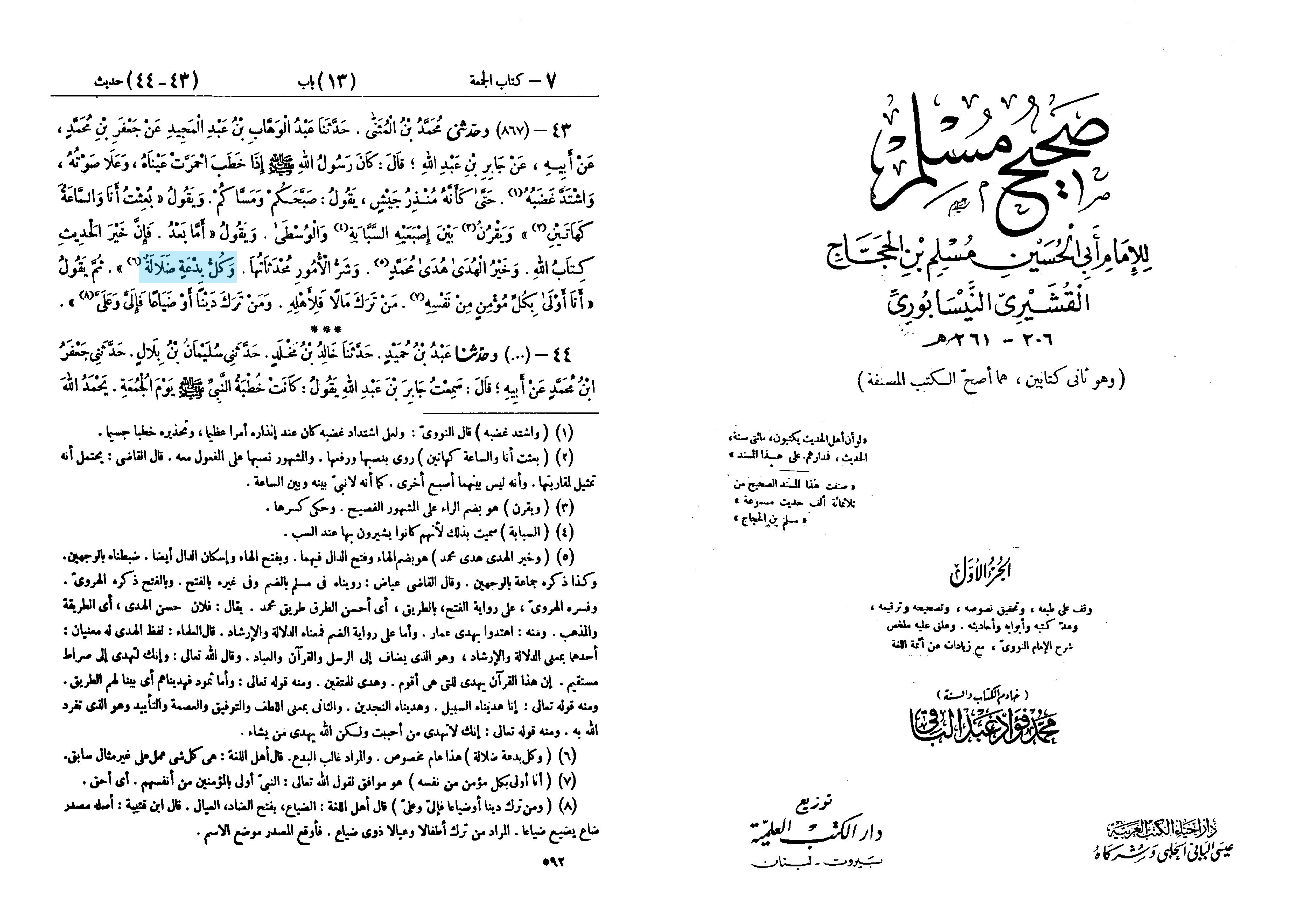
See: Sahih Muslim. Volume 2. Page 592. Hadith Number 867.
https://archive.org/details/waq14478/page/n591/mode/1up
https://sunnah.com/muslim:867a
Al-Hafidh An-Nawawiyy:
Kull(u) Innovation is Misguidance means Most Innovations.
Al-Imam An-Nawawiyy, radiyAllahu ^anh, said in the explanation of Sahih Muslim:
قَوْلُهُ صَلَّى اللَّهُ عَلَيْهِ وَسَلَّمَ وَكُلَّ بِدْعَةٍ ضَلَالَةٌ هَذَا عَامٌّ مَخْصُوصٌ وَالْمُرَادُ غَالِبُ الْبِدَعِ
which means: “His saying: ‘Every innovation is misguidance’ is a specified generalization, and the intent is most innovations.”
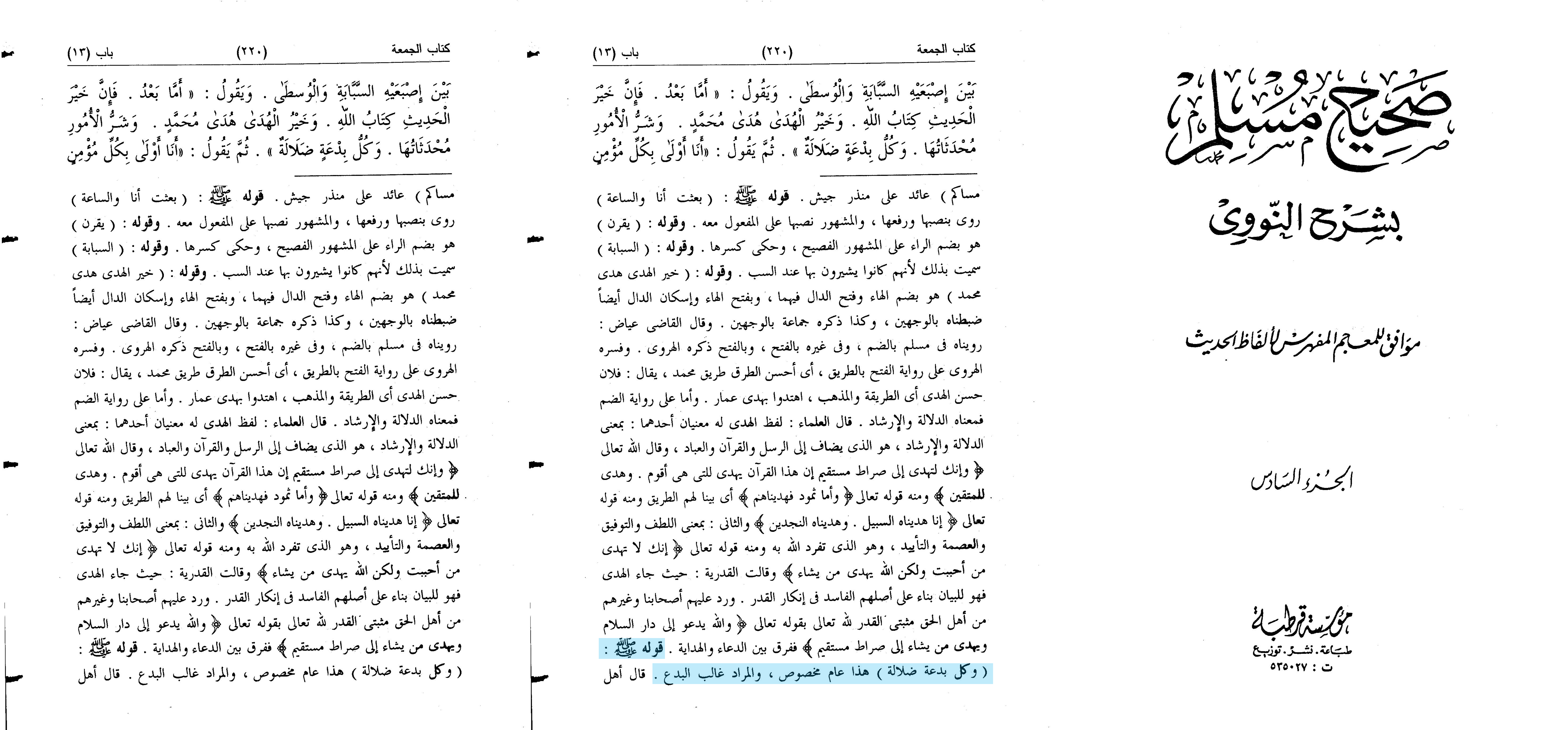
See: Sharh Sahih Muslim (Explanation of Sahih Muslim) by Al-Imam An-Nawawiyy. Volume 6. Page 220-221.
https://archive.org/details/waq13422/06_13424/page/n219/mode/1up
Hadith
Example of Kull meaning Most.
Ibn Hibban narrated that the Prophet ﷺ said:
كُلُّ عَيْنٍ زَانِيَة
“Every eye is a fornicator.”
Despite the general wording, the Prophets, pious people, blind men, and children are not included, so it has a specific meaning. It truly means, “Most eyes glance with the forbidden look; the look that leads to fornication”.
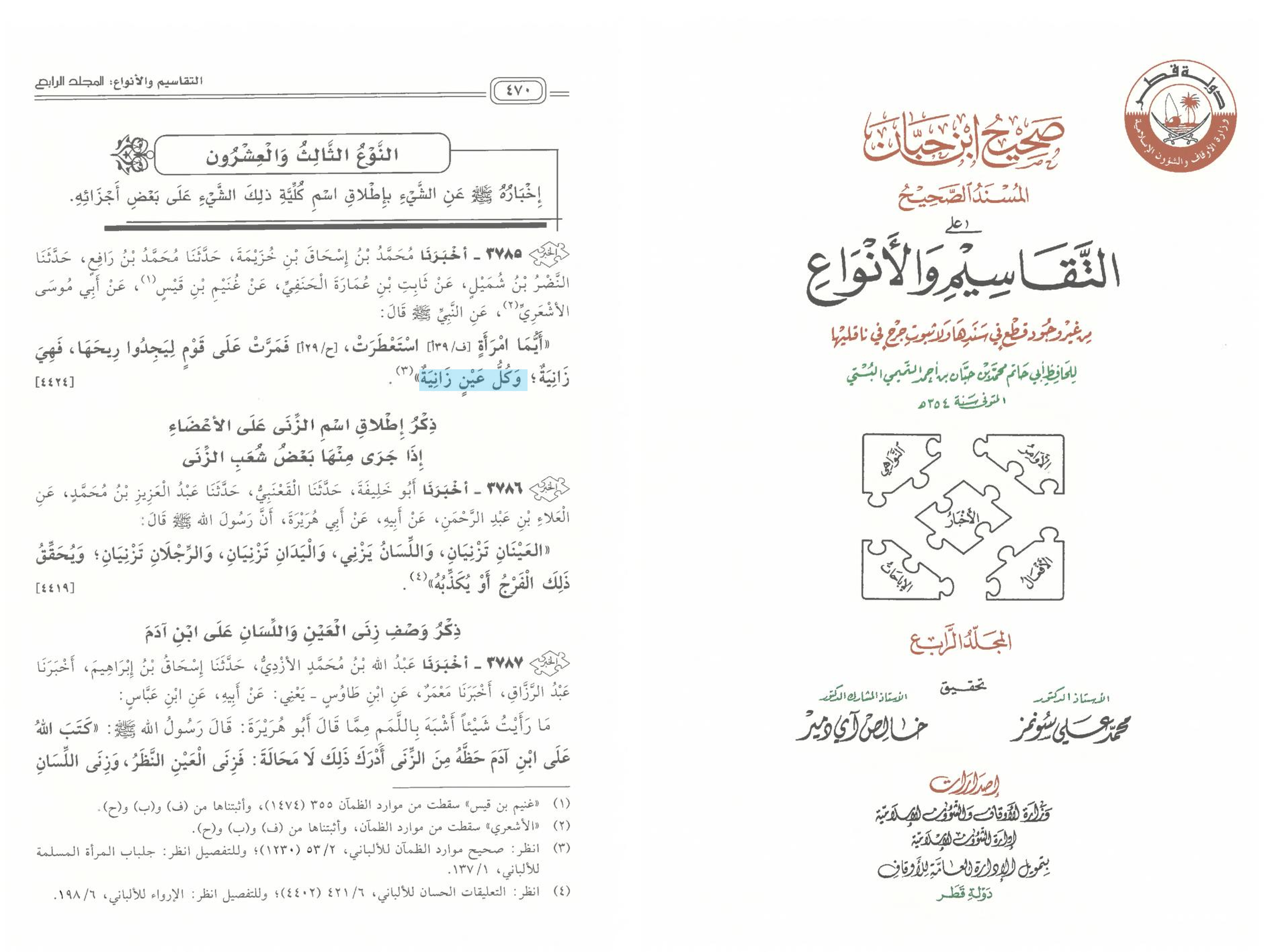
See: Sahih Ibn Hibban. Volume 4. Page 470. Hadith Number 3785
https://archive.org/details/dandanqaqa_gmail_7_20171121/%D8%A7%D9%84%D9%85%D8%AC%D9%84%D8%AF%204/page/n471/mode/1up
See: https://sunnah.com/mishkat:1065
See: https://sunnah.com/tirmidhi:2786
Quranic
Example of Kull meaning Most.
Allah revealed in Surah Al-‘Ahqaf (S46) Ayah 25:
The verse from the Qur’an should convince the doubtful:
﴿ تُدَمِّرُ كُلَّ شَىْء ﴾
<It was destroying everything.>
It means <<That wind destroyed most things in the area>>.
The violent windstorm that destroyed the tribe of ˆAd blew on them for seven nights and eight days consecutively.
Certainly, this verse does not mean that the wind destroyed everything, for that would include Heavens and Earth entirely! Therefore, despite the general wording, the intended meaning is specific.
Sahih Hadith of Al-Bukhariyy:
Whoever Innovates In This Matter Of Our, What Does Not Comply With It, Then It Is
Rejected.
The hadith of Lady ^A’ishah, radiyAllahu ^anha, in Sahih Al-Bukhariyy:
مَنْ أَحْدَثَ فِي أَمْرِنَا هَذَا مَا لَيْسَ مِنْهُ فَهُوَ رَدٌّ
“Whoever invents something that does not comply with (the rules of) this Religion of ours is rejected.”
What is understood from this is that if the new action does comply with the rules of the Religion, then it is not rejected! It does not say:
من أحدث في أمرنا هذا فهو رد
“Whoever innovates into our Religion is rejected.”
Rather, the Prophet ﷺ gave a qualifying statement:
مَا لَيْسَ مِنْهُ
“That which does not comply with it”.
We say that every word of the Prophet counts. According to their explanation, it is as if the Prophet ﷺ did not say those few words!
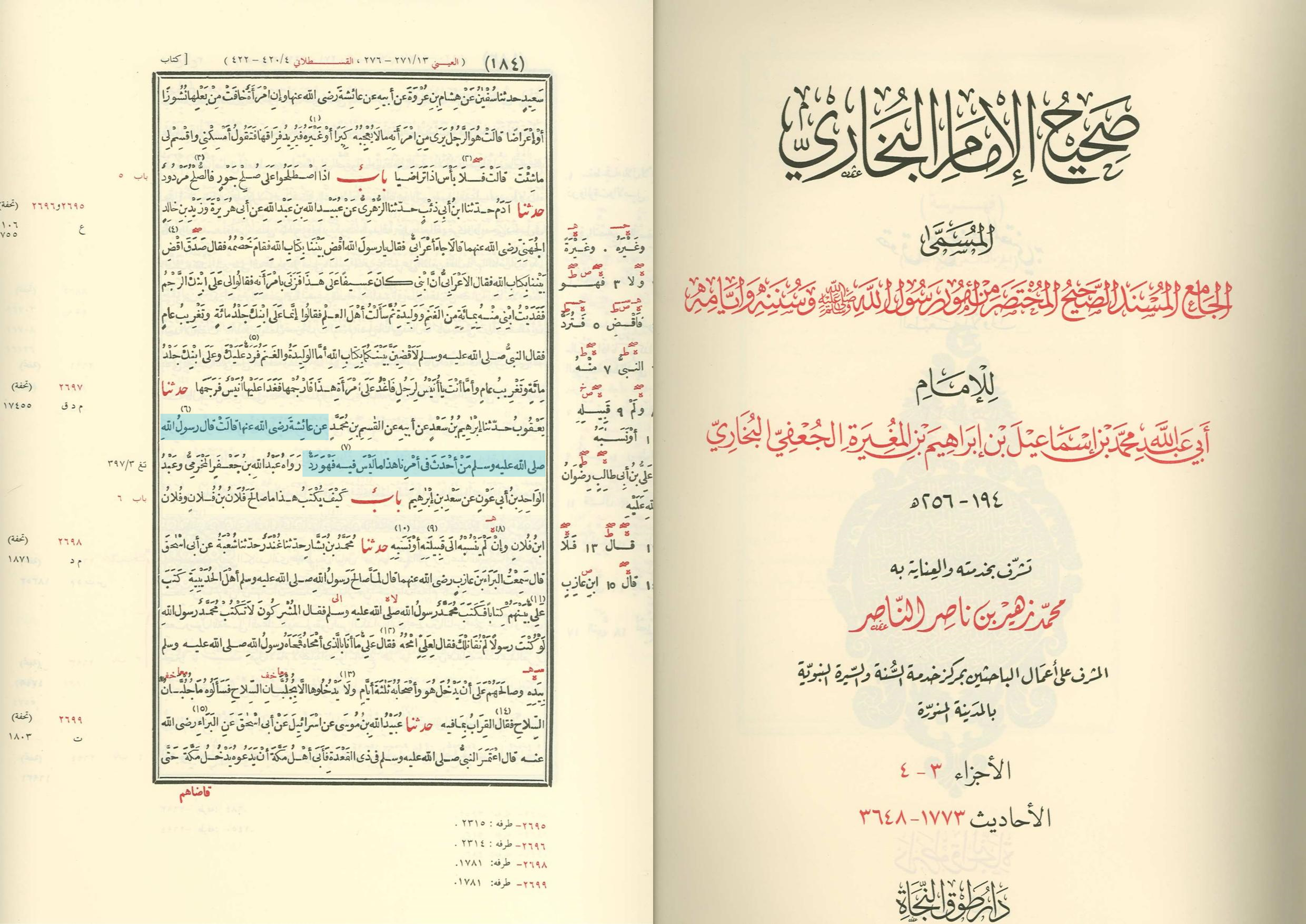
See: Sahih Al-Bukhariyy. Volume 3. Page 184. Hadith Number 2697.
https://archive.org/details/sa71mir_gmail_P03/P03/page/n192/mode/1up
https://sunnah.com/bukhari:2697
Al-Imam Ash-Shafi^iyy: Innovations Are Of Two Types.
Al-Imam Ash-Shafiˆiyy said narrated by Al-Bayhaqiyy in Manaqib Ash-Shafi^iyy, and Al-Hafidh Ibn Hajar mentioned it Fath Al-Bari:
الْمُحْدَثَاتُ ضَرْبَانِ مَا أُحْدِثُ يُخَالِفُ كِتَابًا أَوْ سُنَّةً أَوْ أَثَرًا أَوْ إِجْمَاعًا فَهَذِهِ بِدْعَةُ الضَّلَالِ وَمَا أُحْدِثُ مِنَ الْخَيْرِ لَا يُخَالِفُ شَيْئًا مِنْ ذَلِكَ فَهَذِهِ مُحْدَثَةٌ غَيْرُ مَذْمُومَةٍ
The innovated matters are of two types: what was innovated conflicting with something from the Book, the Sunnah, the athar or the consensus. This is the innovation of misguidance, and what was innovated of the good, not conflicting with anything from those sources. That is an innovation that is not dispraised.
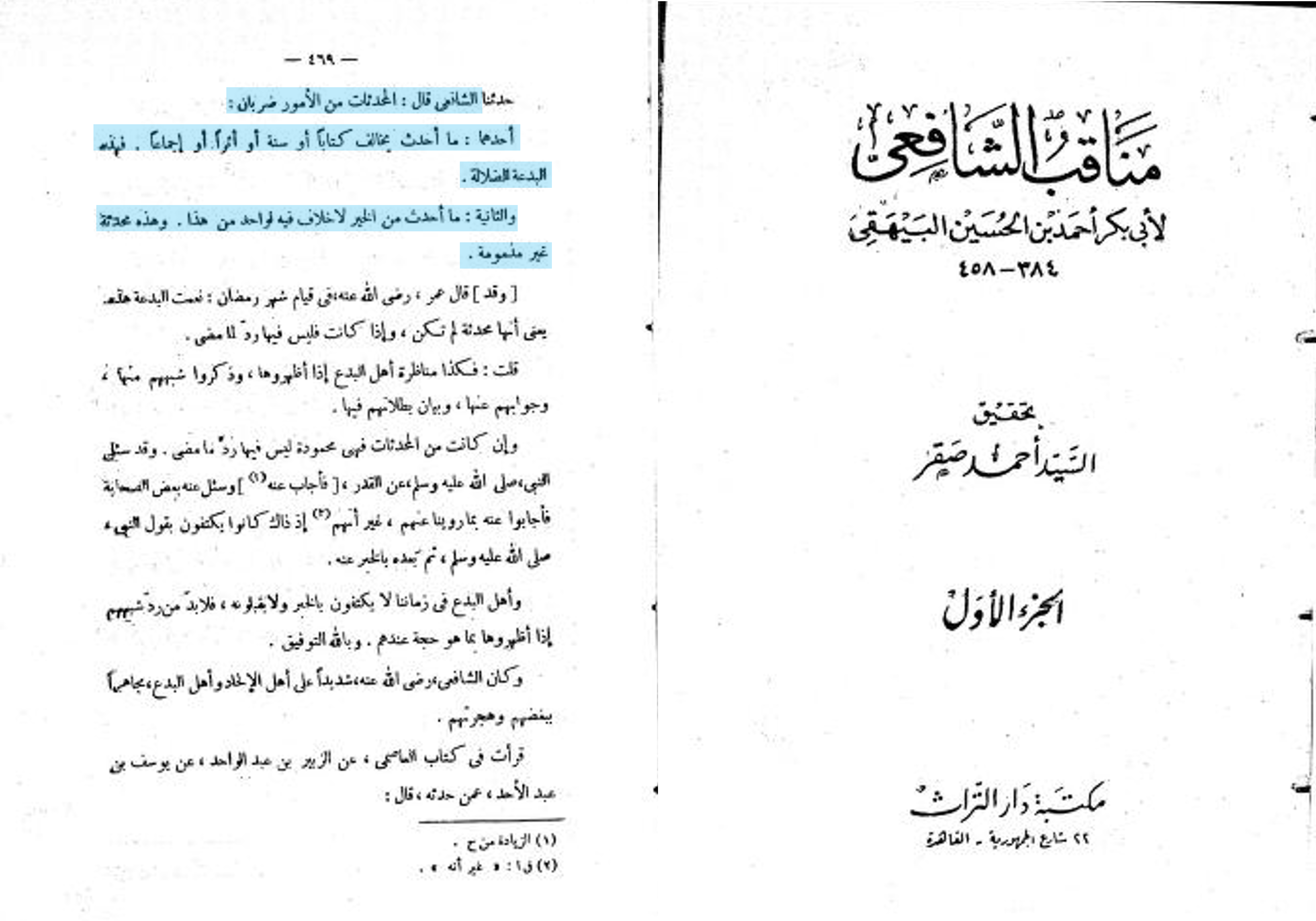
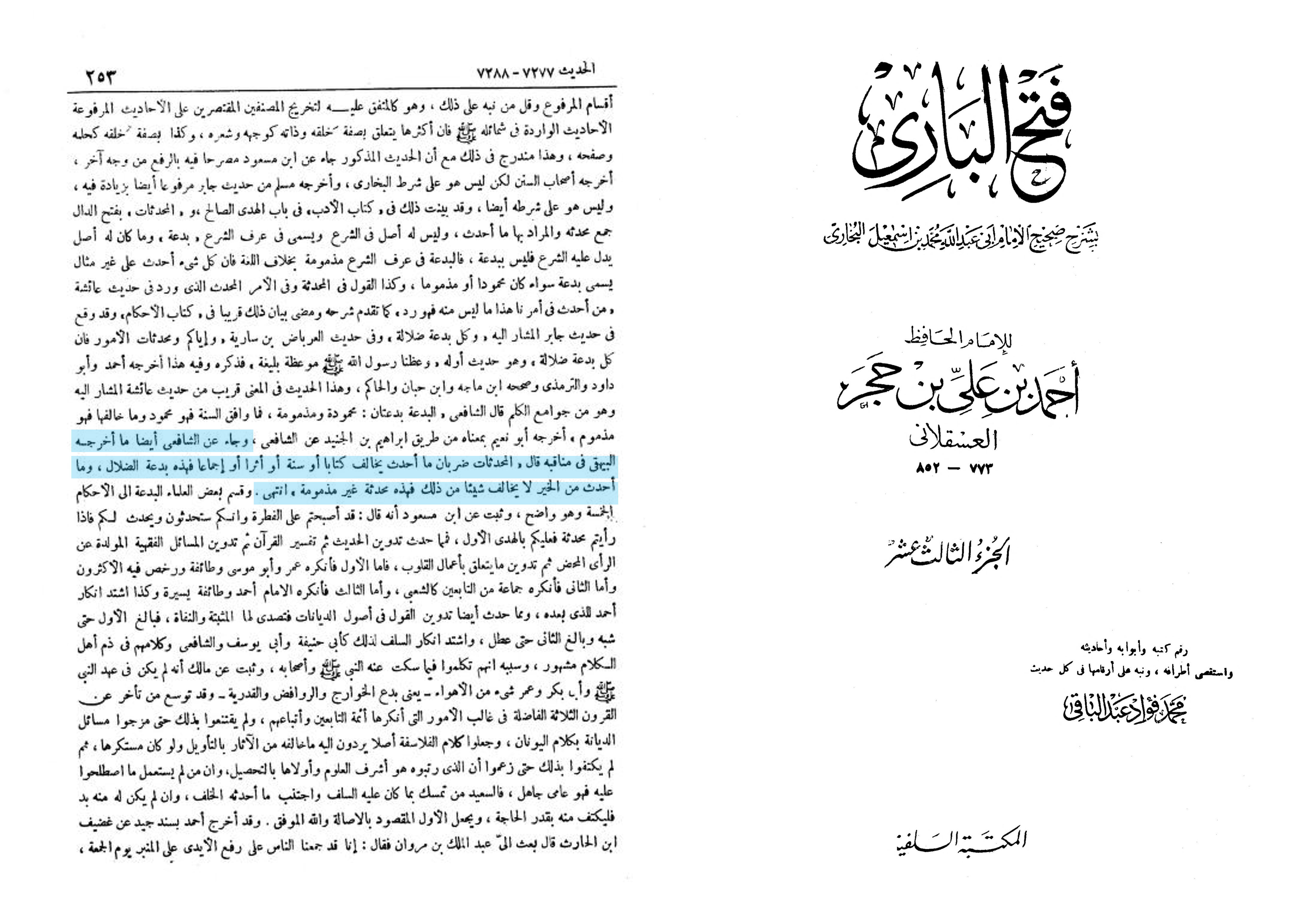
See: Manaqib Ash-Shafi^iyy by Al-Bayhaqiyy. Volume 1. Page 469.
https://archive.org/details/waqmnsh/01_mnsh/page/n468/mode/1up
See: Fath Al-Bari. Volume 13. Page 253.
https://archive.org/details/FP2021/13_2034/page/n252/mode/1up
Ibn Kathir on King Mudhaffar
and The Mawlid is Honourable.
In Al-Bidayah Wan-Nihayah, Ibn Kathir (who the Wahhabiyys deem an Imam) not only praised King Al-Mudhaffar as being an upright scholar, he did so after stating “he engaged in Al-Mawlid Ash-Sharif (The Honourable Mawlid) in Rabi^ Al-Awwal”.
قُلْتُ: أَمَّا صَاحِبُ إِرْبِلَ فَهُوَ: الْمَلِكُ الْمُظَفَّرُ، أَبُو سَعِيدٍ كُوكُبُرِي بْنُ زَيْنِ الدِّينِ عَلِيِّ بْنِ بُكْتِكِينَ أَحَدُ الْأَجْوَادِ وَالسَّادَاتِ الْكُبَرَاءِ وَالْمُلُوكِ الْأَمْجَادِ، لَهُ آثَارٌ حَسَنَةٌ، وَقَدْ عَمَّرَ الْجَامِعَ الْمُظَفَّرِيَّ بِسَفْحِ قَاسِيُونَ، وَكَانَ قَدْ هَمَّ بِسِيَاقَةِ الْمَاءِ إِلَيْهِ مِنْ مَاءِ بَرْزَةَ، فَمَنَعَهُ الْمُعَظَّمُ مِنْ ذَلِكَ، وَاعْتَلَّ بِأَنَّهُ قَدْ يَمُرُّ عَلَى مَقَابِرِ الْمُسْلِمِينَ بِالسُّفُوحِ، وَكَانَ يَعْمَلُ الْمَوْلِدَ الشَّرِيفَ فِي رَبِيعٍ الْأَوَّلِ، وَيَحْتَفِلُ بِهِ احْتِفَالًا هَائِلًا. وَكَانَ مَعَ ذَلِكَ شَهْمًا شُجَاعًا بَطَلًا عَاقِلًا عَالِمًا عَادِلًا – رَحِمَهُ اللَّهُ تَعَالَى.
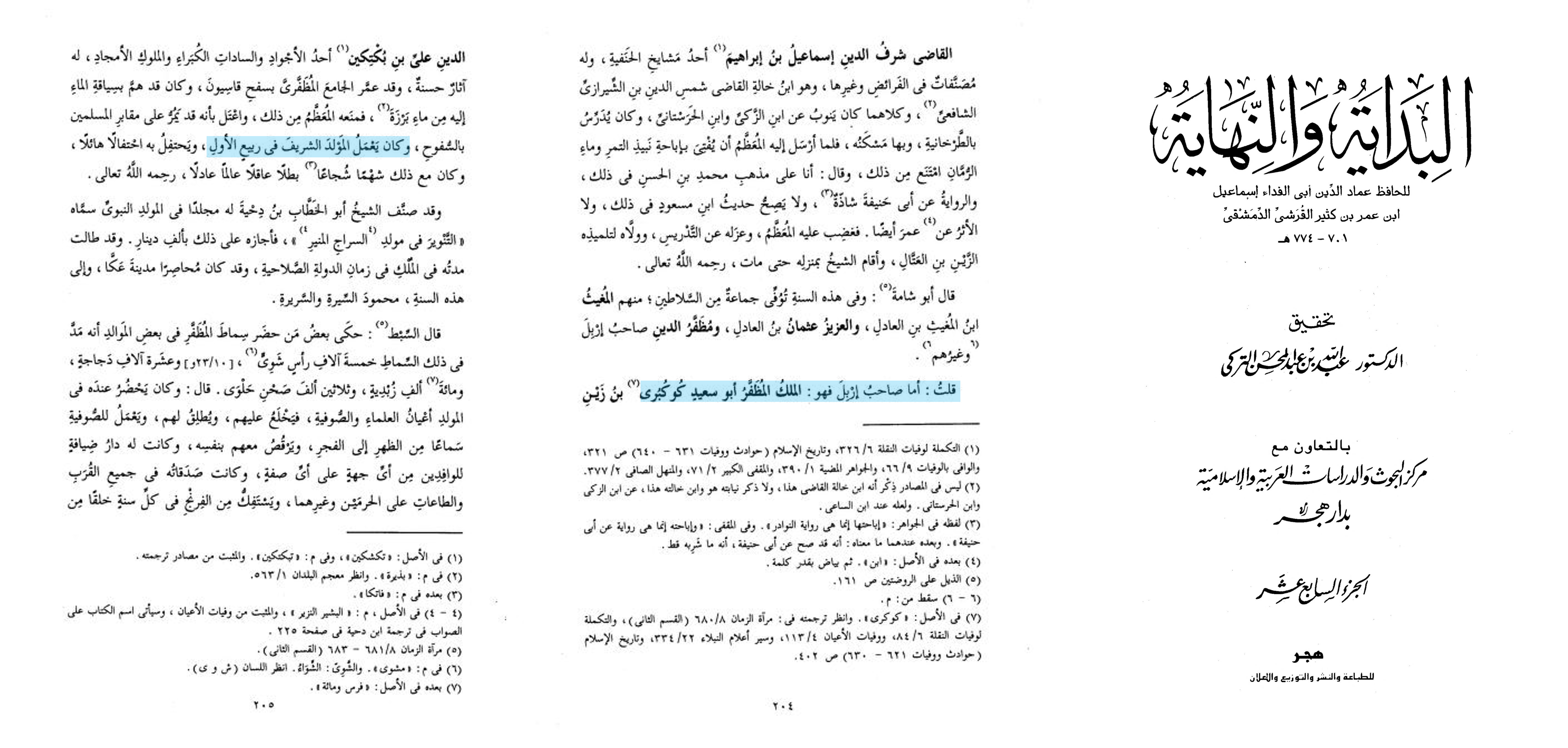
See: Al-Bidayah Wan-Nihayah. Volume 17. Pg 204-205.
https://archive.org/details/FP41905_201505/bn17/page/n203/mode/2up
Ibn Taymiyyah on Mawlid Being
Rewardable
Ibn Taymiyyah said in his book which he titled Iqtida’ As–Sirat Al-Mustaqim (Vol 2, Page 126):
فتعظيم المولد واتخاذه موسمًا قد يفعله بعض الناس ويكون له فيه أجر عظيم لحسن قصده وتعظيمه لرسول الله صلى الله عليه وسلم
“Some people may glorify the Mawlid and celebrate it, and they are rewarded greatly for doing so, because of the good purpose and indication it shows, and because of the glorifying of the Messenger of God ﷺ by doing so”.
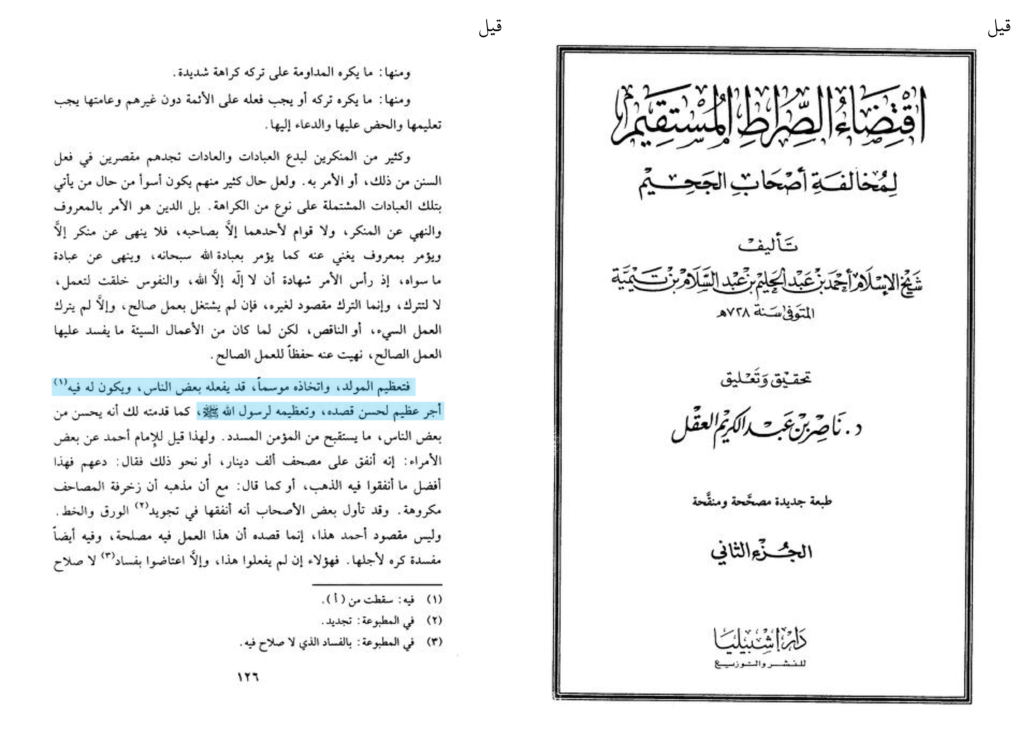
Manuscript:
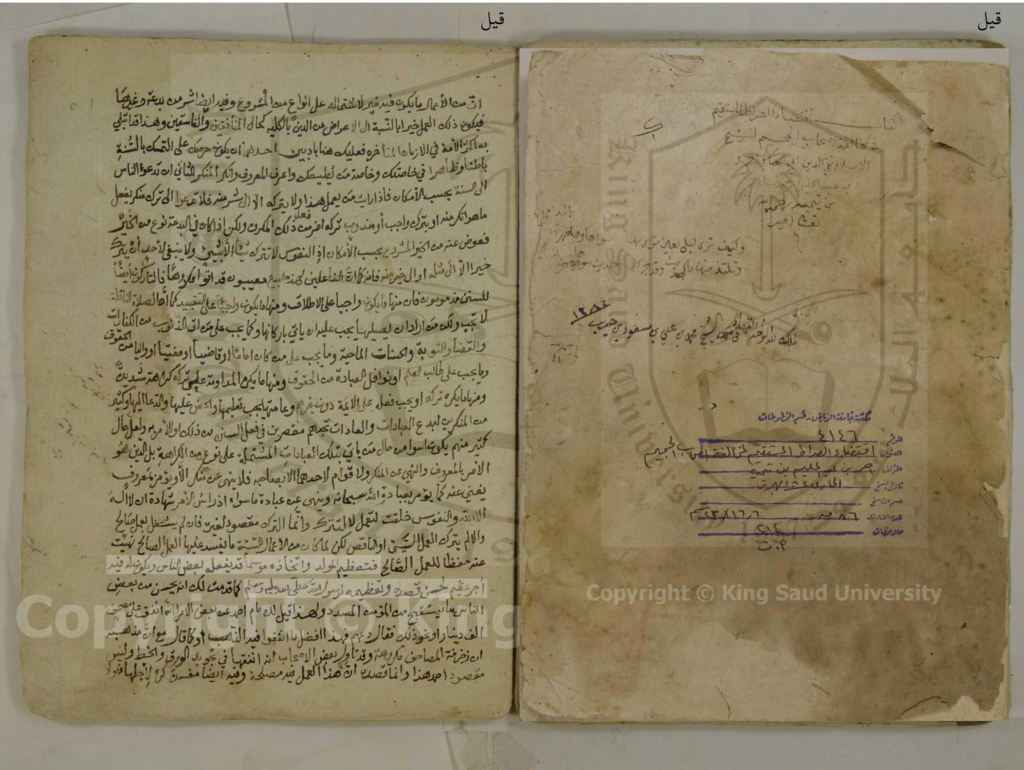
See: Iqtida’ As–Sirat Al-Mustaqim. Volume 2. Page 126.
https://archive.org/details/FP158171/02_158172/page/n125/mode/2up
Ibn Taymiyyah mentions Ash-Shafi^iyy
Said There Is Two Types of Innovations
Ibn Taymiyyah said (Majmu^ Al-Fatawa Vol. 20 Pg. 163) conveyed the statement of Al-Imam Ash-Shafi^iyy that there are two types of innovations.
قَالَ الشَّافِعِيُّ – رَحِمَهُ اللَّهُ -: الْبِدْعَةُ بِدْعَتَانِ: بِدْعَةٌ خَالَفَتْ كِتَابًا وَسُنَّةً وَإِجْمَاعًا وَأَثَرًا عَنْ بَعْضِ أَصْحَابِ رَسُولِ اللَّهِ صَلَّى اللَّهُ عَلَيْهِ وَسَلَّمَ فَهَذِهِ بِدْعَةُ ضَلَالَةٍ. وَبِدْعَةٌ لَمْ تُخَالِفْ شَيْئًا مِنْ ذَلِكَ فَهَذِهِ قَدْ تَكُونُ حَسَنَةً لِقَوْلِ عُمَرَ: نِعْمَتْ الْبِدْعَةُ هَذِهِ هَذَا الْكَلَامُ أَوْ نَحْوُهُ رَوَاهُ البيهقي بِإِسْنَادِهِ الصَّحِيحِ فِي الْمَدْخَلِ
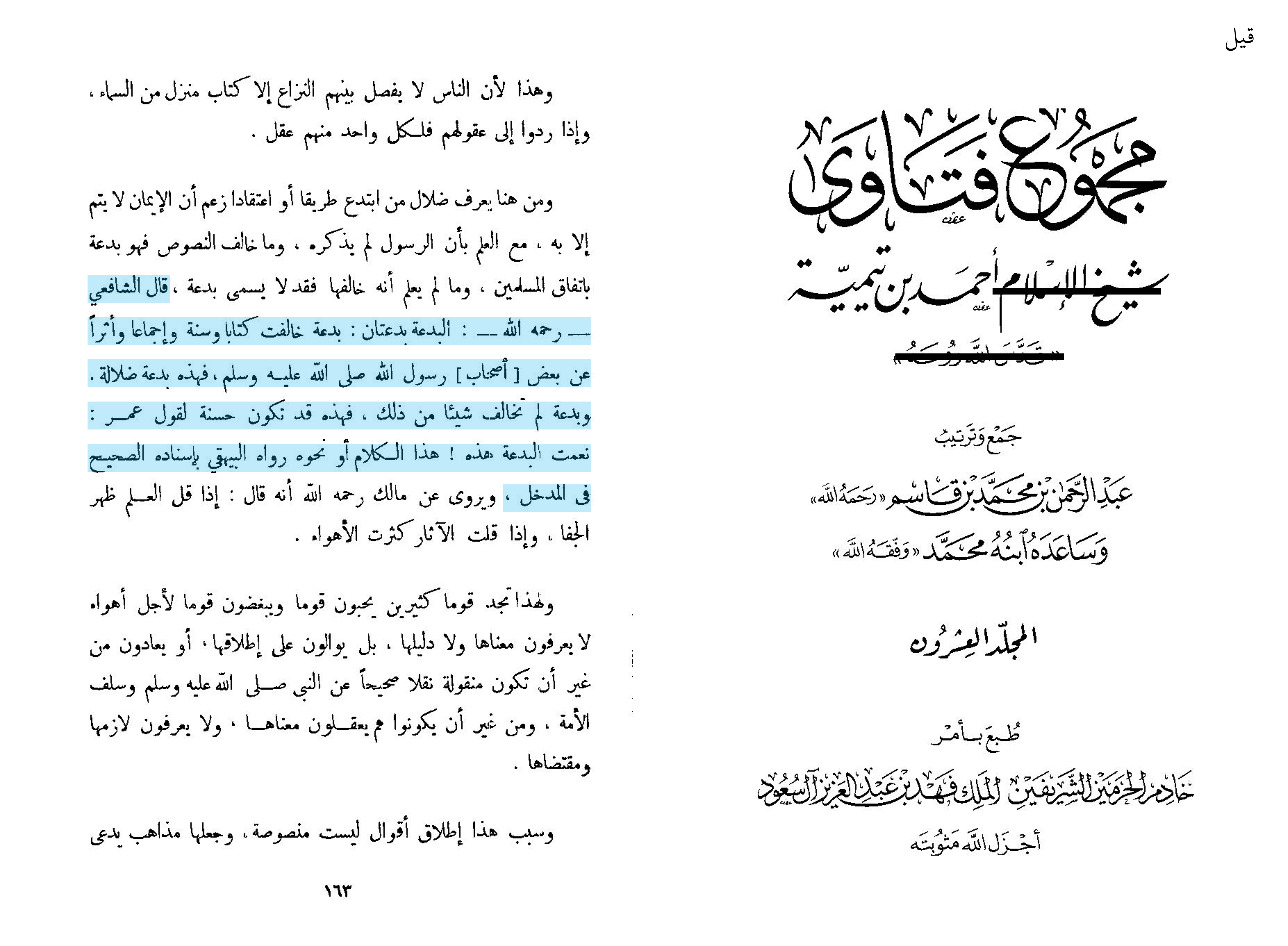
See: Majmu^ Al-Fatawa Volume 20 Page. 163
https://archive.org/details/mfsiaitmmfsiaitm/mfsiaitm20/page/n162/mode/2up
Al-Imam An-Nawawiyy, The Shafi^iyy
Scholar. Innovation in Divided into Good and Bad.
Al-Hafidh An-Nawawiyy documented in Tahdhibu-l-Asma’i wa-l-Lughat:
البِدعة بكسر الباء في الشرع هي إحداث ما لم يكن في عهد رسول الله – صَلَّى اللهُ عَلَيْهِ وَسَلَّمَ – وهي منقسمة إلى: حسنة وقبيحة
The bidˆah – with a kasrah on the ba’ – according to the religious (jargon) is every newly initiated thing that was not at the time of the Messenger of Allah ﷺ, and it is divided into good and bad.
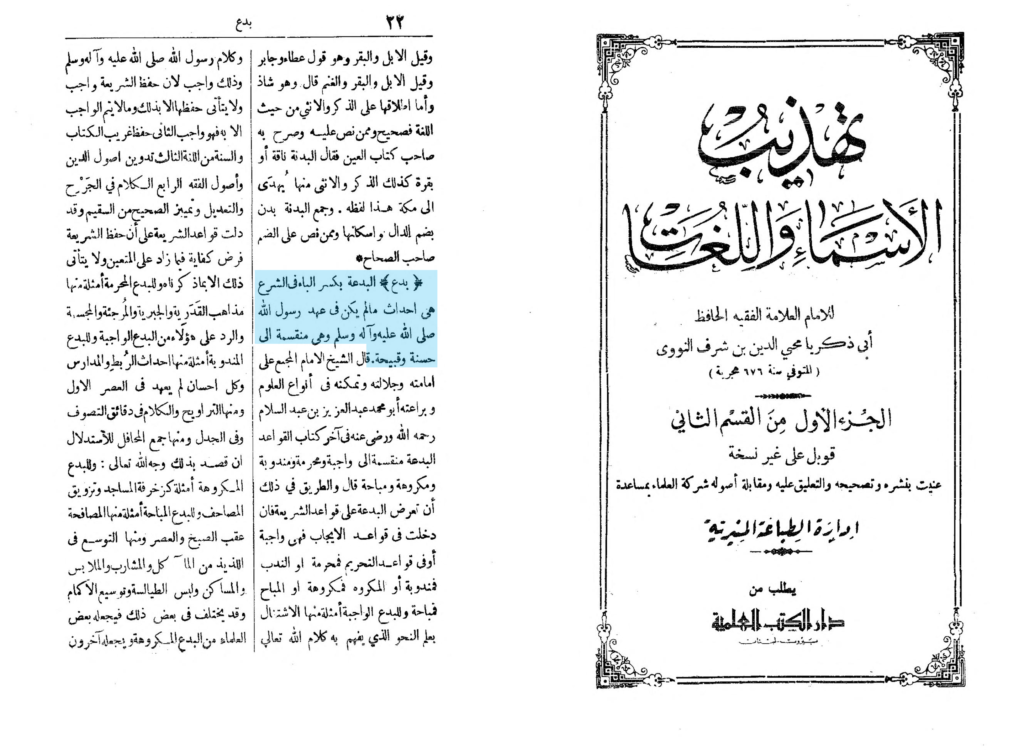
See: Tahdhib Al-Asma’ Wal-Lughat by Al-Imam An-Nawawiyy. Volume 3. Page 22.
https://archive.org/details/FPtaltal/tal3/page/n21/mode/1up
Al-Imam Ibn ^Abidin, The Hanafiyy Scholar. Innovation in
Divided into Good and Bad.
Ash-Shaykh Ibn ^Abidin Al-Hanafiyy in Radd Al-Muhtar ^ala Durril-Mukhtar.
فَقَدْ تَكُونُ وَاجِبَةً كَنَصْبِ الْأَدِلَّةِ لِلرَّدِّ عَلَى أَهْلِ الْفِرَقِ الضَّالَّةِ وَتَعَلُّمِ النَّحْوِ الْمُفْهِمِ لِلْكِتَابِ وَالسُّنَّةِ وَمَنْدُوبَةً كَإِحْدَاثِ نَحْوِ رِبَاطٍ وَمَدْرَسَةٍ وَكُلِّ إحْسَانٍ لَمْ يَكُنْ فِي الصَّدْرِ الْأَوَّلِ وَمَكْرُوهَةً كَزَخْرَفَةِ الْمَسَاجِدِ. وَمُبَاحَةٍ كَالتَّوَسُّعِ بِلَذِيذِ الْمَآكِلِ وَالْمَشَارِبِ وَالثِّيَابِ.
“The innovation could be obligatory, like preparation arguments for refuting people of misguided sects, and learning the syntax that enables understanding the Book and the Sunnah[1]; or recommended, like the innovation of inns, schools, and every charitable matter that did not exist in the first days (of Islam); or disliked, like (overly) decorating the masjid; or permissible, such as exaggerating in delicious foods, drinks, and (luxurious) clothing.”
Take Note: The correct judgement about indulging in luxury is that it is disliked, because of the hadith about that: “Beware of luxury, indeed, the (pious) slaves of Allah are not people of luxury.”
[1] This is in reference to the one who wants to convey the hadith and interpret the Qur’an.
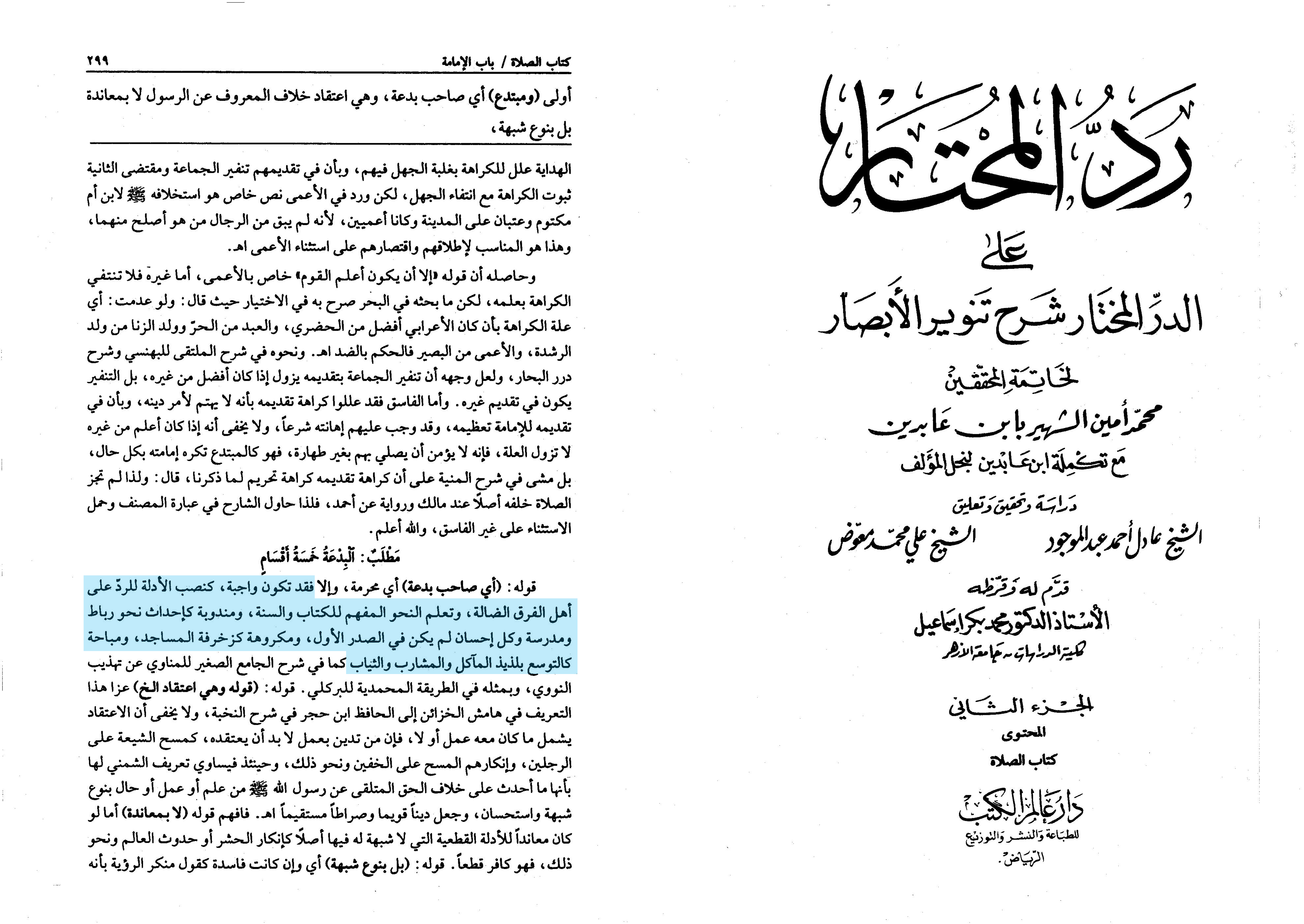
See: Ibn ^Abidin. Radd Al-Muhtar. Volume 2. Page 299.
https://archive.org/details/waq61487/02_61488/page/n298/mode/1up
^Umar ibnul-Khattab said “What a Good Innovation This Is!”
Amirul-Mu’minin ˆUmar, may Allah increase his status, after ordering the people to pray tarawih prayers behind one imam, then returning on a different night to find the people still praying as he ordered – something the Prophet ﷺ never ordered, nor Abu Bakr, said:
نِعْمَتِ الْبِدْعَةُ هَذِهِ
“What a good innovation this is”
This saying of ^Umar was narrated by Malik in his Muwatta’ and Al-Bayhaqiyy in As-Sunan As-Sughra. The wording of Al-Bukhariyy in is (نِعْمَ الْبِدْعَةُ هَذِه)
This makes the Wahhabis’ blood boil.
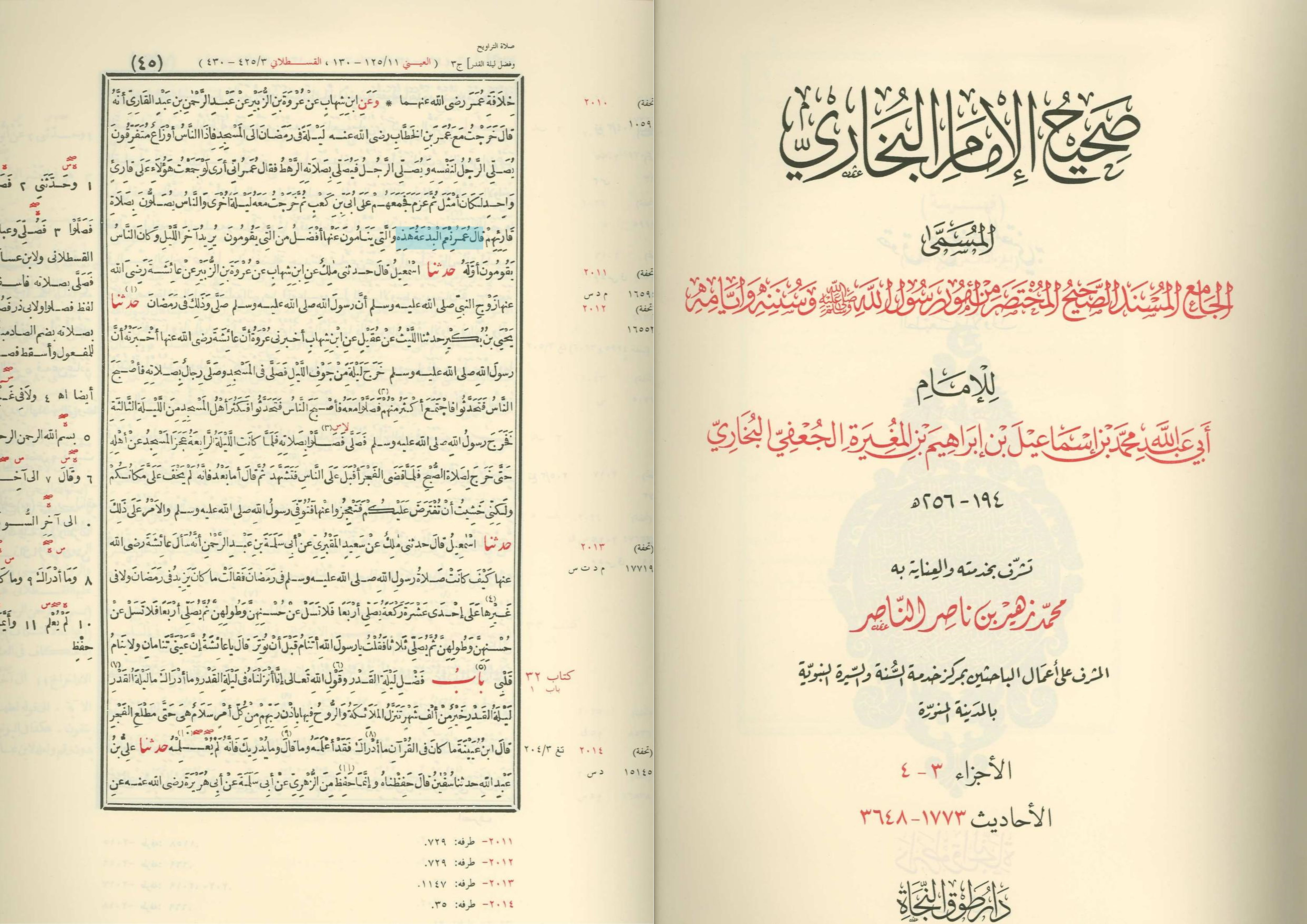
See: Sahih Al-Bukhariyy. Volume 3. Page 45. Hadith Number 2010.
https://archive.org/details/sa71mir_gmail_P03/P03/page/n53/mode/1up
https://sunnah.com/bukhari:2010
See: Malik. Muwatta’ Malik. Volume 1. Page 109. Hadith Number 279.
See: Al-Bayhaqiyy. As-Sunan As–Saghir. Volume 1. Page 294. Hadith Number 816.
Al-Hafidh Ibn Hajar
Al-^Asqalaniyy on What ^Umar
said.
Al-Hafidh Ibn Hajar, radiyAllahu ^anh, said:
وَقَول عمر نعمت الْبِدْعَة: هُوَ فعل مَا لم يسْبق إِلَيْهِ فَمَا وَافق السّنة فَحسن وَمَا خَالف فضلالة وَهُوَ المُرَاد حَيْثُ وَقع ذمّ الْبِدْعَة وَمَا لم يُوَافق وَلم يُخَالف فعلى أصل الْإِبَاحَة
which means: ˆUmar’s Saying: ‘What a good bidˆah’ [Bid^ah] is what has no precedent, so what complies with the Sunnah is good, and what opposes is misguidance, and that is the intent wherever there fell a dispraise for bidˆah, and whatever does not comply (with the rewardable), nor oppose (the lawful), it is fundamentally permitted.
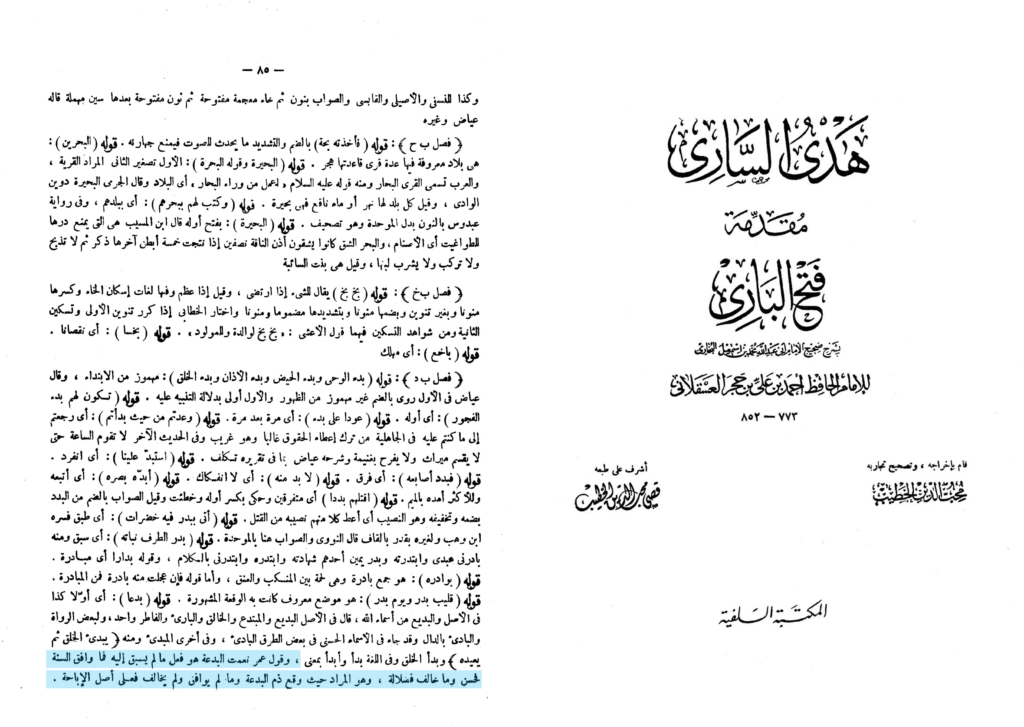
See: Fath Al-Bari by Al-Imam Ibn Hajar Al-^Asqalaniyy. Introduction. Page 85
https://archive.org/details/FP2021/01p_2021/page/n84/mode/1up
Al-Hafidh Ahmad ibn Hajar Al-^Asqalaniyy said in Fath Al-Bari:
«قَوْلُهُ قَالَ عُمَر نِعْمَ الْبِدْعَة فِي بَعْضِ الرِّوَايَات نِعْمَتِ الْبِدْعَة بزياة تَاء وَالْبِدْعَةُ أَصْلُهَا مَا أُحْدِثَ عَلَى غَيْرِ مِثَالٍ سَابِق وَتُطْلَقُ فِي الشَّرْعِ فِي مُقَابِلِ السُّنَّة فَتَكُونُ مَذْمُومَة وَالتَّحْقِيقُ إِنْ كَانَتْ مِمَّا تَنْدَرِجُ تَحْتَ مُسْتَحْسِنٍ فِي الشَّرْعِ فَهِيَ حَسَنَة وَإِنْ كَانَت مِمَّا تَنْدَرِجُ تَحْتَ مُسْتَقْبَحٍ فِي الشَّرْعِ فَهِيَ مُسْتَقْبَحَة وَإِلَّا فَهِيَ مِنْ قِسْمِ الْمُبَاح وَقَدْ تَنْقَسِمُ إِلَى الْأَحْكَامِ الْخَمْسَةِ»
which means: His saying “^Umar said “what a good innovation (نِعْمَ الْبِدْعَةُ)”” in some narrations (نِعْمَتِ الْبِدْعَةُ) there is an addition of the letter ta’. The original meaning of “bid^ah (innovation)” is what was done without a previous example. Religiously, its unqualified use refers to what is contrary to the prophetic way, so it would be blameworthy. What is exact is that if it is included under what is deemed good in the Sacred Law, then it is good, and if it is included under what is deemed ugly in the Sacred Law, it is deemed ugly, or else it is a type of permitted thing. It could even be divided into the Five Judgements.”
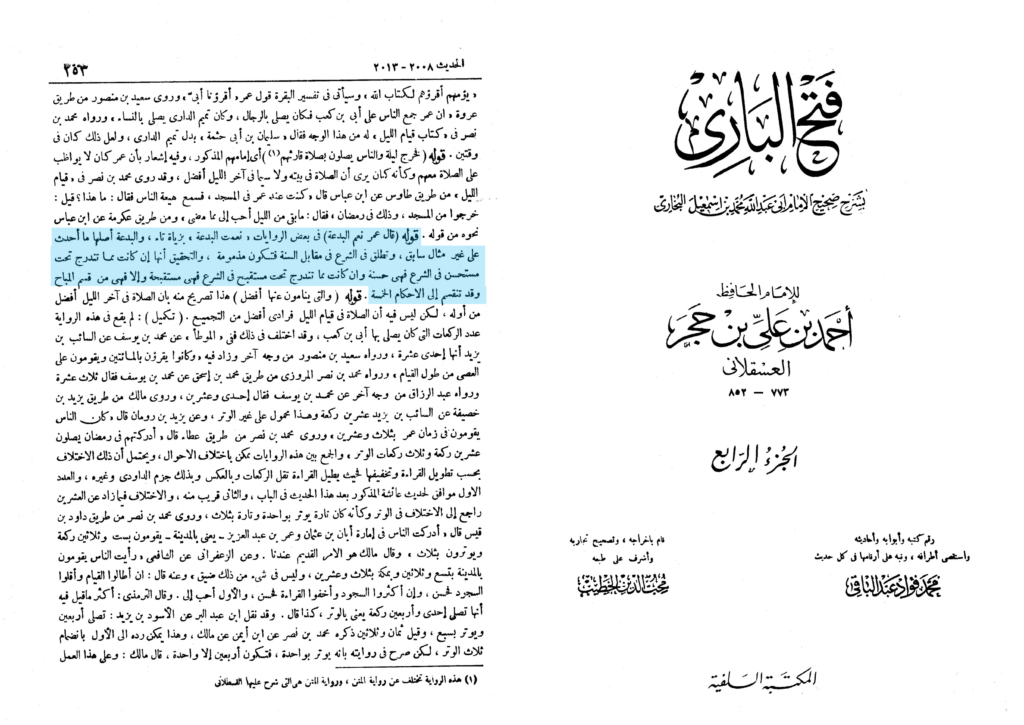
See: Fath Al-Bari by Al-Imam Ibn Hajar Al-^Asqalaniyy. Volume 4. Page 253.
https://archive.org/details/FP2021/04_2025/page/n252/mode/1up
Example of Good Innovation. Khubayb. Two
Rak^ahs Before Being Executed.
Al-Bukhariyy narrated that Khubayb Ibn ˆAdiyy Al-‘Ansariyy prayed two rakˆahs before the pagans executed him. ‘Abu Hurayrah, who knows better about the Religion than the Wahhabis, said:
فَكَانَ أَوَّلَ مَنْ سَنَّ الرَّكْعَتَيْنِ عِنْدَ القَتْلِ هُوَ
“The first to make a sunnah of praying two rakˆahs upon being killed was him.”
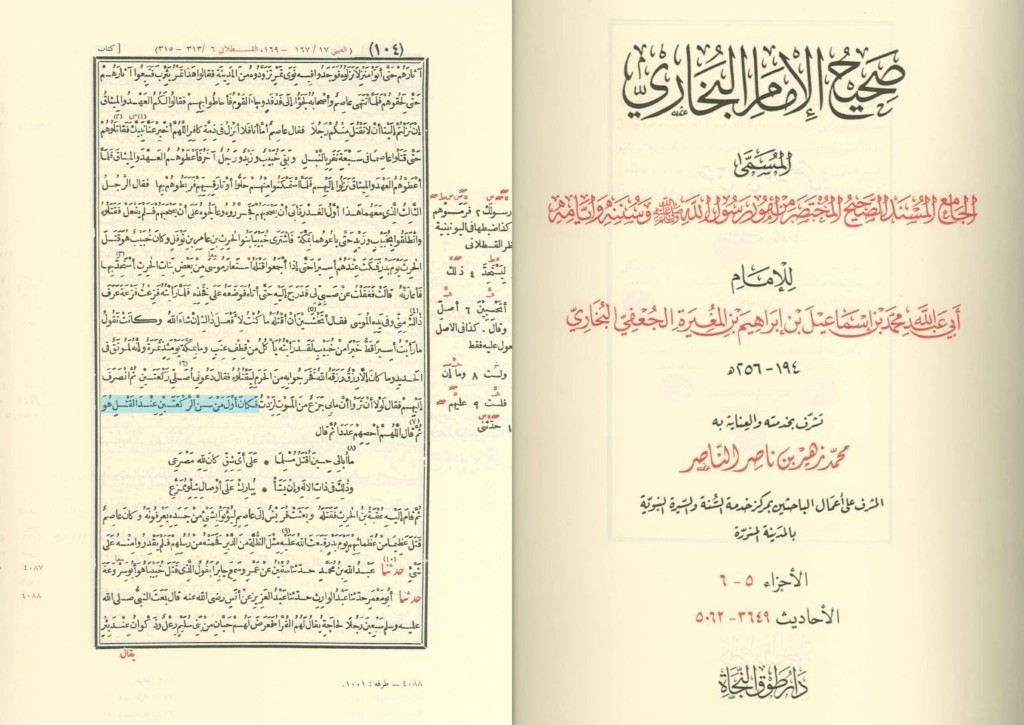
See: Sahih Al-Bukhariyy. Volume 5. Page 103. Hadith Number 4086.
https://archive.org/details/sa71mir_gmail_P03/P05/page/n112/mode/1up
https://sunnah.com/bukhari:4086
Example of Good Innovation. ^Uthman
Inventing a Second Adhan for Friday Prayer.
Al-Bukhariyy narrated from As-Sa’ib Ibn Yazid:
كَانَ النِّدَاءُ يَوْمَ الجُمُعَةِ أَوَّلُهُ إِذَا جَلَسَ الإِمَامُ عَلَى المِنْبَرِ عَلَى عَهْدِ النَّبِيِّ صَلَّى اللهُ عَلَيْهِ وَسَلَّمَ وَأَبِي بَكْرٍ وَعُمَرَ رَضِيَ اللَّهُ عَنْهُمَا فَلَمَّا كَانَ عُثْمَانُ رَضِيَ اللَّهُ عَنْهُ وَكَثُرَ النَّاسُ زَادَ النِّدَاءَ الثَّالِثَ عَلَى الزَّوْرَاءِ
“The call (to prayer) on Friday would be initiated when the imam sat on the pulpit during the time of the Prophet, ‘Abu Bakr and ˆUmar. Then, when ˆUthman ruled and the numbers of people increased, he added the third call[1] at the market of Zawra‘.”
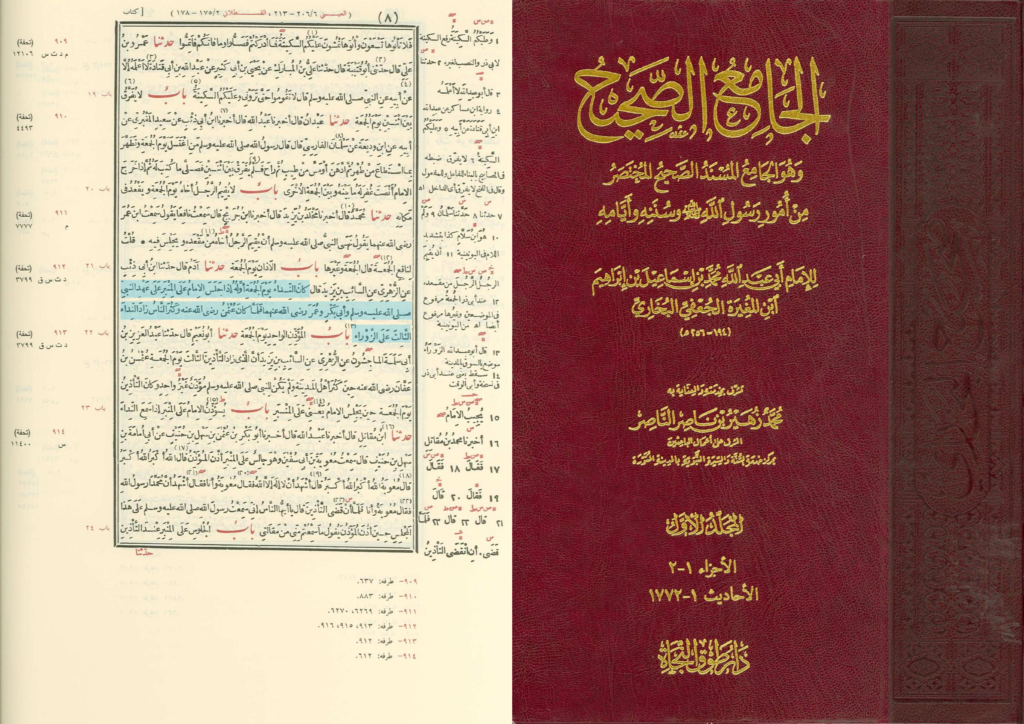
See: Sahih Al-Bukhariyy. Volume 2. Page 8. Hadith Number 912.
https://sunnah.com/bukhari:912
https://archive.org/details/sa71mir_gmail_P03/P02/page/n11/mode/1up
No One Objected to the Mawlid Initially.
The Nation Does Not Gather on a Misguidance.
The Prophet ﷺ said:
ما كان الله ليجمع أمةَ محمدٍ على ضلالة
“Allah will not let (the scholars of) Muhammad’s nation agree on a misguidance. ”
When the Mawlid was first done some 800 years ago, not a scholar objected, not even Ibn Taymiyah, nor the scholars of the centuries after that, thereby establishing the Consensus of its validity. Among them were Al-ˆAsqalaniyy, his student As-Sakhawiyy, and As-Siyutiyy, who dedicated a booklet to the topic: Husnu-l-Maqsid Fi ˆAmali-l-Mawlid.
Al-Hafidh As-Sakhawiyy
& His Shaykh Al-Hafidh Ibn Hajar on the Mawlid
As-Sakhawiyy documents in Al-Ajwibah Al-Mardiyyah[1] that his shaykh Ibn Hajar proved the validity of the Mawlid by the authentic hadith[2]:
عَنِ ابْنِ عَبَّاسٍ رَضِيَ اللَّهُ عَنْهُمَا قَالَ: قَدِمَ النَّبِيُّ صَلَّى اللَّهُ عَلَيْهِ وَسَلَّمَ المَدِينَةَ فَرَأَى اليَهُودَ تَصُومُ يَوْمَ عَاشُورَاءَ، فَقَالَ: «مَا هَذَا؟»، قَالُوا: هَذَا يَوْمٌ صَالِحٌ هَذَا يَوْمٌ نَجَّى اللَّهُ بَنِي إِسْرَائِيلَ مِنْ عَدُوِّهِمْ، فَصَامَهُ مُوسَى، قَالَ: «فَأَنَا أَحَقُّ بِمُوسَى مِنْكُمْ»، فَصَامَهُ، وَأَمَرَ بِصِيَامِهِ
The Prophet ﷺ came to Madinah and found the Jews fasting ˆAshura’. He said, “What is this?” They said, “This is a good day! This is a day in which Allah rescued the Children of Israel from their enemy, so Moses used to fast this day. The Prophet ﷺ said, “It is more appropriate that I observe the practice of Moses than you.” So, he fasted that day and commanded the Believers to fast.
He said:
This hadith promotes thanking Allah for an endowment that He gave or a calamity that He relieved on a particular day, then that day returns the coming year. Thanking Allah takes place by all sorts of worships, like prostrating, fasting, and reciting, and what endowment is greater than the appearance of this Prophet on that day? According to this, it should be limited to what shows appreciation and thanks to Allah by doing like what was mentioned. As for what follows that, such as listening to or playing instruments, it should be said that whatever is permissible and aids in spreading happiness among the Muslims, there is nothing wrong with adding that, and whatever is forbidden or disliked is prevented …
[1] [As-Sakhawiyy. Al-Ajwibah Al-Mardiyyah. Volume 3. Page 1118.]
[2] [Al-Bukhariyy. Sahih Al-Bukhariyy. Volume 3. Page 44. Hadith Number 2004.]
Al-Hafidh As-Suyutiyy
on the Mawlid
As-Siyutiyy said in the aforementioned book:
The answer according to me is that the basis of practicing the Mawlid; gathering the people, reciting what is easy of the Qur’an, narrating what came about the Prophet’s beginnings and happened as signs of his birth, having a spread laid out so that they can eat, then they leave without doing more than (something like) that, is a good innovation whose practitioner is rewarded, because of what it contains of glorifying the Prophet’s status …
Wahhabi Hypocrisy. They Celebrated
MIAW Week but Prohibit the Mawlid?!
Ibn Baz Prohibiting the Mawlid
Ibn Baz, who the Wahhabiyys referred to as “the Mufti of Saudi Arabia”, said:
لا يجوز الاحتفال بمولد الرسول ﷺ ولا غيره؛ لأن ذلك من البدع المحدثة في الدين؛
“It is not permissible to celebrate the birth of the Messenger and not for other than him, for indeed that is among innovations in the Religion”.
See Ibn Baz’s Website: Click Here.
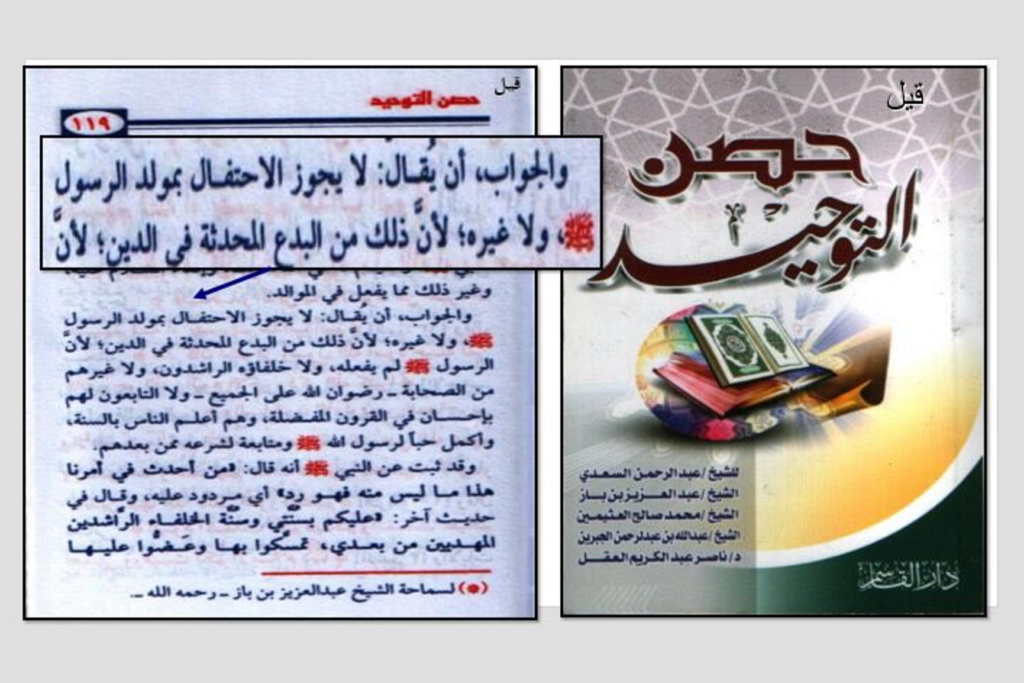
See: https://binbaz.org.sa/fatwas/20/%D9%81%D9%8A-%D8%AD%D9%83%D9%85-%D8%A7%D9%84%D8%A7%D8%AD%D8%AA%D9%81%D8%A7%D9%84-%D8%A8%D8%A7%D9%84%D9%85%D9%88%D8%A7%D9%84%D8%AF-%D8%A7%D9%84%D9%86%D8%A8%D9%88%D9%8A%D8%A9-%D9%88%D8%BA%D9%8A%D8%B1%D9%87%D8%A7
Ibn Baz's Speech For So-Called "MIAW Week"
Ibn Baz in his book Majmu^ Fatawa (Vol 1, Page 378):
ابن باز قال: كلمة في أسبوع الشيخ محمد بن عبد الوهاب
“Speech during Sheikh Muhammad Ibn `AbdulWahhab Week”
Among what Ibn Baz says in this speech: [in his book Majmu^ Fatawa (Vol 1, Page 383-384)]:
أيها الإخوة، أعضاء الأسبوع، لقد كنت راغبا في لقياكم والحديث معكم، ومناقشة الأبحاث المقدمة، والآراء المعروضة والاشتراك معكم في حلقاتكم ودراساتكم؛ لأن في ذلك تعاونا على الخير، ولكني شغلت عن ذلك بالمجلس الأعلى العالمي للمساجد المنعقد في مكة المكرمة، ومن بعده المجمع الفقهي اللذين تنظمهما رابطة العالم الإسلامي التي تلتقي معكم في اهتمامكم وجهودكم مما حال دون تحقيق رغبتي في مشاركتكم هذه الفرصة الطيبة،وجعلني أكتب إليكم هذه الكلمة
“Dear brothers! I had hoped to meet with you, discuss proposed themes and opinions and take part in your assemblies, as this involves cooperation in goodness. Unfortunately, I was busy with the meetings of the International Higher Council for Mosques, held in Makkah. After that came the conference of the Islamic Fiqh Academy (IFA) organized by the Muslim World League (MWL) which shares your interests. All of this made me unable to be with you at this blessed gathering. That is why I am writing you these words”
[In his book Majmu^ Fatawa (Vol 1, Page 384):]
وأشكر لصاحب السمو الملكي الأمير سلمان بن عبد العزيز أمير منطقة الرياض رعايته لحفل الافتتاح، كما أشكر للإخوة المشرفين على تنظيم هذا الأسبوع جهودهم وإسهامهم،
“I would like to thank His Highness, Prince Salman Ibn `Abdul`Aziz, Prince of Riyadh for sponsoring the opening ceremony. I would like also to thank the organizers of the events of this week and scholars for their participation.”
The above English translations are provided by the so-called “Portal of the General Presidency of Scholarly Research and Ifta’”
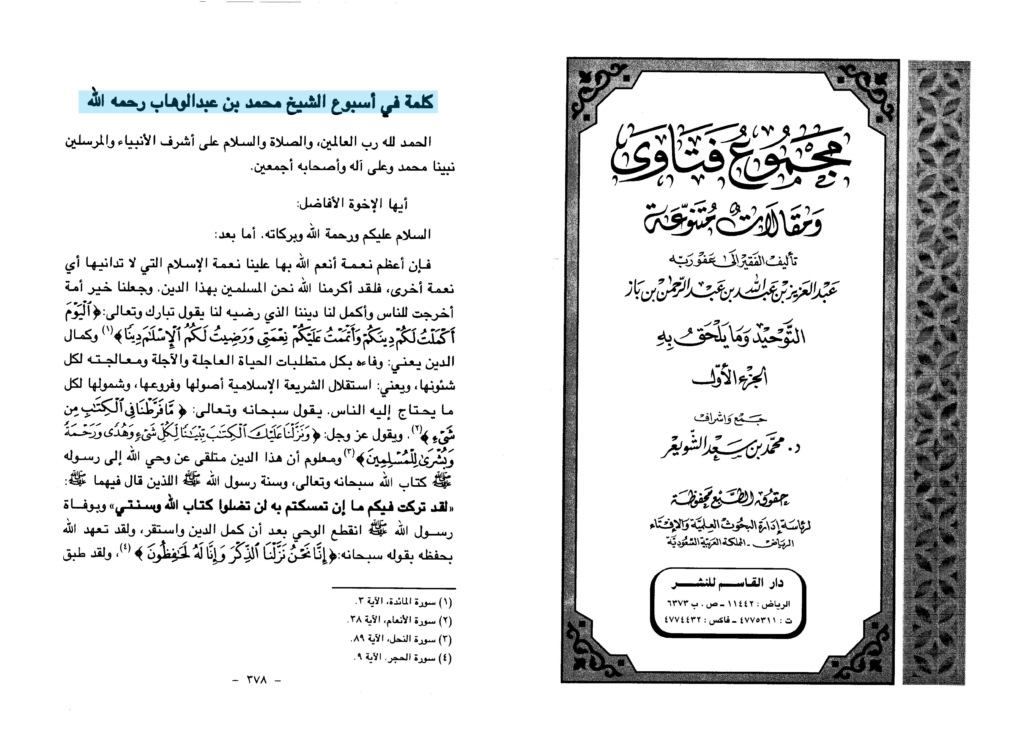
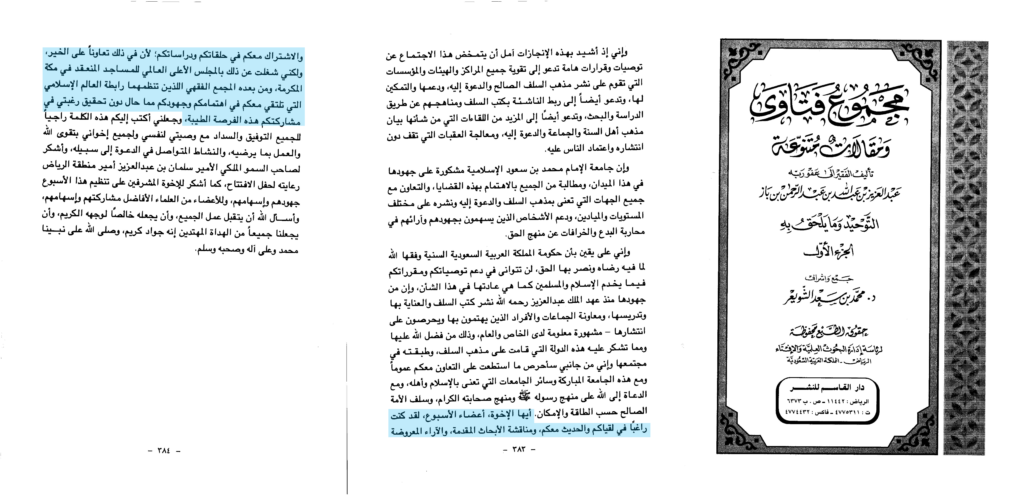
See: Arabic Book Link [See Vol 1. Page 378 – Page 384]: https://archive.org/details/mfmmmfmm/mfmm01/page/n378/mode/2up
Arabic also can be found on Ibn Baz Website: https://binbaz.org.sa/discussions/5/%D9%83%D9%84%D9%85%D8%A9-%D9%81%D9%8A-%D8%A7%D8%B3%D8%A8%D9%88%D8%B9-%D8%A7%D9%84%D8%B4%D9%8A%D8%AE-%D9%85%D8%AD%D9%85%D8%AF-%D8%A8%D9%86-%D8%B9%D8%A8%D8%AF%D8%A7%D9%84%D9%88%D9%87%D8%A7%D8%A8-%D8%B1%D8%AD%D9%85%D9%87-%D8%A7%D9%84%D9%84%D9%87
English Translation Link: https://d1.islamhouse.com/data/en/ih_books/chain/en_Majmoo_alFatawa_IbnBaz/en_01_Majmoo_alFatawa_IbnBaz.pdf [English Translation: Page 188-190]
Ibn Qayyim on Ibn Taymiyyah Saying Ya
Hayyu Ya Qayyum 40 times after Fajr.
Ibn Qayyim Al-Jawziyyah
the student of Ibn Taymiyyah in his book Madarij As-Salikin
(Vol 3, Page 248) said:
«وَسَمِعْتُ شَيْخَ الْإِسْلَامِ ابْنَ تَيْمِيَّةَ رَحِمَهُ اللَّهُ يَقُولُ: مَنْ وَاظَبَ عَلَى ” يَا
حَيُّ يَا قَيُّومُ. لَا إِلَهَ إِلَّا أَنْتَ ” كَلَّ يَوْمٍ بَيْنَ سُنَّةِ
الْفَجْرِ وَصَلَاةِ الْفَجْرِ أَرْبَعِينَ مَرَّةً أَحْيَى اللَّهُ بِهَا قَلْبَهُ»
“I heard Sheikhul-Islam Ibn Taymiyyah,
may Allah have mercy on him, saying: “Whoever is consistent on Ya
Hayyu Ya Qayyum La Ilaha illa Anta
every day between the sunnah of Fajr and the (obligatory) prayer of Fajr, forty
times, Allah will revive his heart by it.”
(Where did the Prophet
ﷺ
instruct this to be done specifically? Isn’t this an innovation according to
your definition?! Also, when did the Prophet ﷺ ever call someone “Sheikhul-Islam”?)
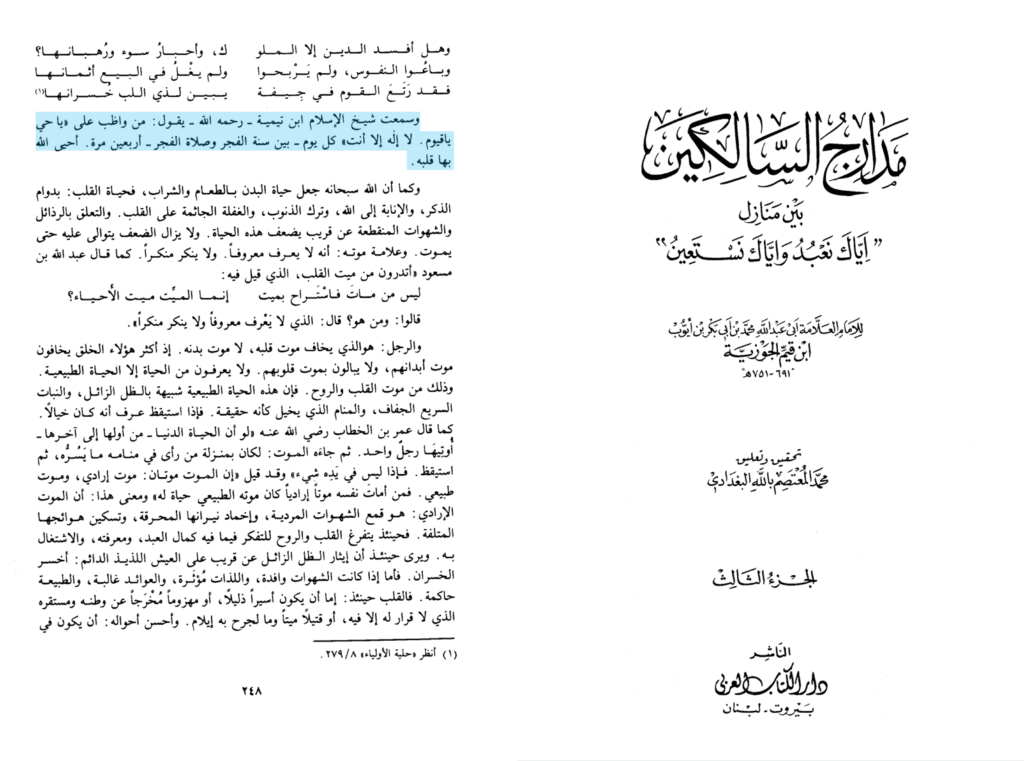
Ibn Taymiyyah Said There Is No Issue in
Using the Prayer Beads While Praying. AlAlbaniyy Said: They Did Not
Exist at the Time of the Prophet ﷺ.
COMING SOON.
Evil Innovation of Ibn Taymiyyah, the
Belief of Eternal Creation.
COMING SOON.

Alhumdulillah thanks for the info very detailed and clear.